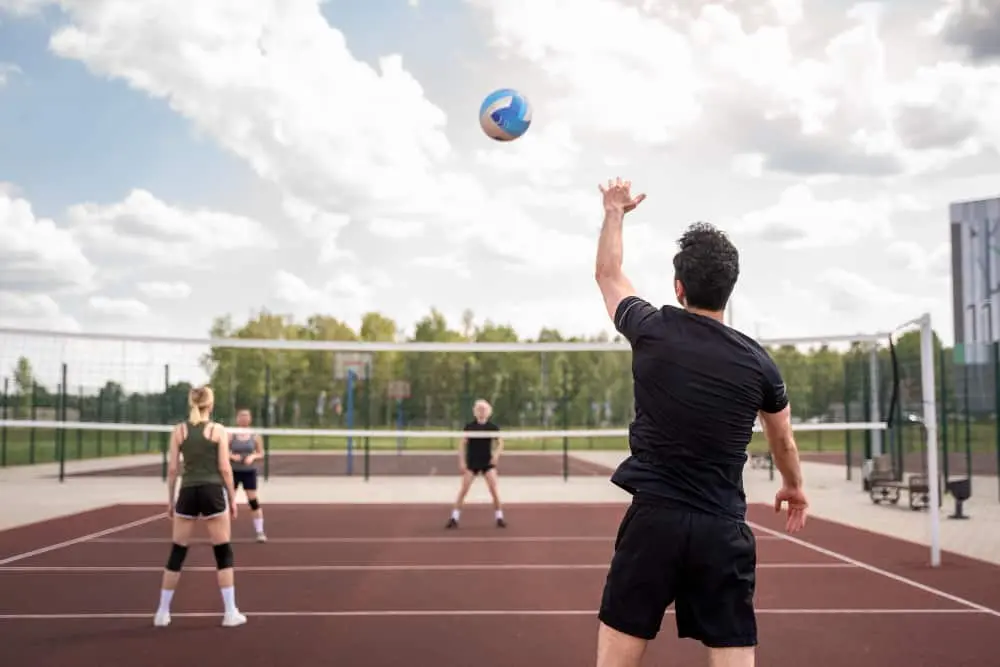Share This Article
Just like sports in general, playing volleyball is also very beneficial for body health, because it relies on strength in the arms and agility that uses muscles and joints. So, if you do it regularly, there will be many benefits of volleyball for the body. Anything, right? Come on, check out the explanation below.
About Volleyball
William G. Morgan, who discovered the sport of volleyball in 1895, explained that the origins of this physical activity started from simple things, namely the desire to create an alternative game for people who thought basketball was too heavy.“In looking for a suitable game, tennis came to mind, but it requires a racket, ball, net and other equipment. Although games with nets are very interesting, other sports equipment seems to need to be eliminated. The net is used and installed above the head of an average height person. “Balls are needed and various types of balls like basketball itself, but they are too heavy and big,” explained Morgan as quoted from the Olympic page.
Because of this, a smaller and lighter ball was specifically designed in 1900. A game was created which was derived from a combination of basketball, baseball, tennis and handball and is now estimated to have been played by more than 800 million people throughout the world.
Benefits of Volleyball for the Body
Here are some of the benefits of volleyball for the body:
Increases Muscle Strength
The movements in volleyball will strengthen the upper and lower muscles of the body, such as the arms, shoulders, thighs and lower legs. This exercise can also help tone and strengthen the cardiovascular and respiratory systems.
Apart from that, volleyball can help circulate more blood, oxygen and nutrients throughout the body, thereby increasing energy to maintain overall body health.
Improve Cognitive Abilities
In fact, according to the Dergipark journal which discusses volleyball, it is stated that this physical activity has the benefit of improving cognitive abilities. The reason is, volleyball players must continuously adapt to take the right actions and direction to respond to their opponent’s steps.
Not just following the rules of the game, players also need to create and develop accurate strategies. Physical exercise that requires substantial cognitive demands, such as volleyball, can alter neurocognitive function and influence brain activation.
Four studies included in the review entitled The Cognitive Benefits of Playing Volleyball: A Systematic Review support that open-skill sports such as volleyball are more effective at improving cognitive skills than closed-skill sports such as running, rowing , or aerobics.
Open skill sports are sports whose pace and speed are influenced by external factors and dynamic, unpredictable conditions. Meanwhile, closed skill sports are sports where the pace and speed are static and predictable.
Chasing the ball and selecting responses in a volleyball match requires attention control, visual processing, and planning, where these activities involve all parts of the brain.
Motor coordination in volleyball also requires a balanced, fast and precise motor response that harmonizes the nervous system and musculoskeletal system. The coordination of all these aspects shows that volleyball has a more positive effect on cognition.
Health Impact of Volleyball for Adult Men
According to the BioMed Research International journal, recreational volleyball with modified intensity (low, moderate to high) carried out twice a week for 12 weeks has been proven to significantly improve fitness and heart and lung health in men aged 25 – 55 years.
Volleyball Sport Injury Risk
Some of the most common injuries in volleyball according to UPMC are:
1. Shoulder injuries due to constant use of the arms can cause volleyball players to suffer:

- benefits of volleyball for health/freepik.com
Irritation and inflammation of the shoulder, especially of the rotator cuff muscles - Tendonitis or tear of the rotator cuff
- Shoulder impingement syndrome, which occurs when muscles or tendons get pinched during movement, causing pain or discomfort.
2. Knee injury. Volleyball players’ lower bodies are most commonly injured. Repeated jumping can cause:
- Patellar tendonitis
Torn ACL (anterior cruciate ligament), which is a ligament located on the inside of the knee that provides stability and the ability to feel the position of the lower leg
Ankle sprains can also occur from running, changing direction, and jumping while playing volleyball.
There are so many benefits of volleyball for the body that you can get if you do this sport regularly. To prevent the risk of injury during the game, it’s best to master the basic techniques of the game and maximize your warm-up before starting to play.
Make sure to check your and your family’s health regularly through Good Doctor, a 24/7 service. Take care of your and your family’s health with regular consultations with our doctor partners. Download the Good Doctor application now, klik click here, ya!


